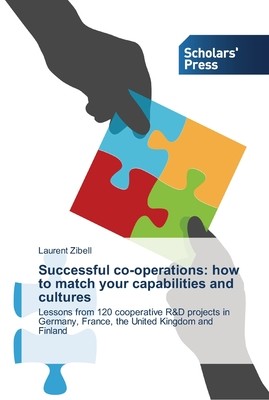
- We will send in 10–14 business days.
- Author: Laurent Zibell
- Publisher: Scholars' Press
- ISBN-10: 3639512537
- ISBN-13: 9783639512533
- Format: 15.2 x 22.9 x 3.6 cm, softcover
- Language: English
- SAVE -10% with code: EXTRA
Reviews
Description
When it comes to setting up a co-operative project between two organisations, questions arise: will our cultures match? will our capabilities complement each other? Answering these questions often determines success or failure. However, existing research has been surprisingly poor at specifying the means to assess this fit or this complementarity, beyond phrases such as "personal chemistry" or "trust". The research reported in this book, performed at Cranfield University and Université Paris 1 Panthéon-Sorbonne, investigates the issue systematically. It rigourously defines concepts such as "organisational culture" and "organisational capabilities", and proposes means to measure them. It investigates 120 co-operative R&D projects, performed in Germany, France, the United Kingdom and Finland by a total of 240 organisations assembled in matched pairs, and relates the capabilities and cultures of both partners to the outcomes of the projects (milestones reached, capabilities learnt, compliance with budget and schedule). The unexpected and novel results of this research lead to recommendations for practitioners and policy makers.
EXTRA 10 % discount with code: EXTRA
The promotion ends in 20d.05:45:33
The discount code is valid when purchasing from 10 €. Discounts do not stack.
- Author: Laurent Zibell
- Publisher: Scholars' Press
- ISBN-10: 3639512537
- ISBN-13: 9783639512533
- Format: 15.2 x 22.9 x 3.6 cm, softcover
- Language: English English
When it comes to setting up a co-operative project between two organisations, questions arise: will our cultures match? will our capabilities complement each other? Answering these questions often determines success or failure. However, existing research has been surprisingly poor at specifying the means to assess this fit or this complementarity, beyond phrases such as "personal chemistry" or "trust". The research reported in this book, performed at Cranfield University and Université Paris 1 Panthéon-Sorbonne, investigates the issue systematically. It rigourously defines concepts such as "organisational culture" and "organisational capabilities", and proposes means to measure them. It investigates 120 co-operative R&D projects, performed in Germany, France, the United Kingdom and Finland by a total of 240 organisations assembled in matched pairs, and relates the capabilities and cultures of both partners to the outcomes of the projects (milestones reached, capabilities learnt, compliance with budget and schedule). The unexpected and novel results of this research lead to recommendations for practitioners and policy makers.


Reviews